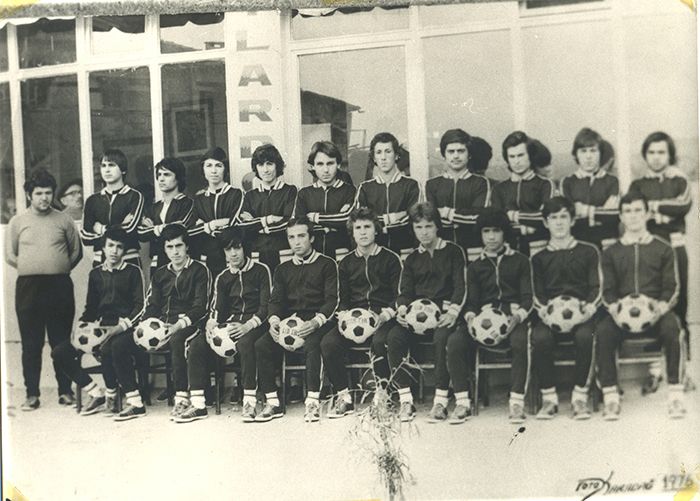Dinamo Mesken
Visual Researcher / Artist:
Ege Berensel
Salt Ulus
January 27 – March 21, 2015

Dinamo Mesken football team
Photo: Cemal Karadağ (1976)
Photo: Cemal Karadağ (1976)
SALT Ulus, Ankara
This exhibition traces the story of Ertuğrulgazi Gençlik ve Spor Kulübü [Ertuğrulgazi Youth and Sports Club], also known as Dinamo Mesken, the only club in the history of football in Turkey that was ordered to close because of its name.
Dinamo Mesken took its name from the Ukrainian football club Dynamo Kyiv, which became the Soviet Supreme League champion several times in the 1970s, and won the UEFA Cup Winners’ Cup in 1975. Depending on interpretation, the club separated or combined politics and football to such an extent that it could bring together members of Dev-Genç [Revolutionary Youth, a Marxist-Leninist organization] and the Grey Wolves [the youth wing of the extreme-right Nationalist Movement Party]. After the September 12 military coup in 1980, the name Dinamo Mesken was described as a “clear attack on national values;” and the club was ordered to close. During this incident a number of the club’s administrators and players were detained, tortured, tried and sentenced.
Ege Berensel’s multi-screen video installation explores how this amateur club, and the social fabric of the area it was established in, were affected by the current conflicts playing out in Turkey. Beyond this, his research touches upon many of the long-lasting effects of the September 12 military intervention on social and urban structures, including the mass housing in the area of Mesken, the “leftist neighborhood” of 1960s Bursa, migrant families, neighborhood solidarity, the conflict between opposing ideologies on the football pitch, the relationship between politics and title deeds, and the introduction of apartments for security forces that were later built in the local area… Berensel also follows the residents of Mesken, who many years later came together to re-establish their club, developing a broad archival presentation on football.
Accompanying this video installation are two slide shows, one of photographs taken by Cemal Karadağ, the local photographer of the sports club who was murdered in 1980, and the other of found photos of amateur football clubs, many of which were shut down after the September 12 military coup.
The exhibition additionally features Biber Gazı Oley! [Pepper Gas Ole!] (2014), Berensel’s short video on the Gezi Resistance and football; Tribün ve Duhuliye [Stands and Basement Level] comprising Hikmet Ildız’s photographs taken in the late 1950s and early 60s; and Görülmüş Kütüphane [Approved Library], two found books, featuring the stamp of approval dated 1978 and 1982. The covers are of the books on football, but inside their sleeves are the banned books, Mahir Çayan: Bütün Yazılar [The Complete Works of Mahir Çayan, the leader of THKP, the People’s Liberation Party-Front of Turkey] and Lenin’s Paris Komünü Üzerine [On the Paris Commune].
Interviewer: Vedat Vermez
Second Camera & Sound: Cahit Sıtkı Çiltaş
Interviewees: Rıdvan Arı, Niyazi Aşır, Erkan Can, Kemal Gültekin, Hasan Gürses, İsmail Güzeltürk, Hüseyin Hürsoy, Ali Nihat İrkörücü, Hamit İzmirli, Ertuğrul Kançay, Raif Kaplanoğlu, Ahmet Karadaş, Avni Karadaş, Bülent Merey, Özcan Selamet, Ömer Severgün, Mehmet Şahin, Kamil Torun, Yüksel Turabik, Vedat Vermez, Tunçkanat Yeğin, Bülent Yıldız
Acknowledgments: Tanıl Bora, Soner Emanet, Fatih Pınar and Sibel Tekin with Bursa Hakimiyet Newspaper, Karataş Birahanesi, Mesken Kıraathanesi, Paşa Dayının Kahvehanesi, Videoccupy
The history of Dinamo Mesken
Ertuğrulgazi Gençlik ve Spor Kulübü [Ertuğrulgazi Youth and Sports Club] was founded in 1971, when the youth of the Mesken neighborhood decided to establish a sports club.
Dynamo Kyiv was a football club that gained success not only in the Soviet Union, but also in Europe, and they were drawn against Bursaspor in the third round of the European Cup Winner’s Cup in the 1974-75 football season, advancing with wins of 1-0 and 2-0. In the game in Bursa, the youth from Mesken, who filled the stands to watch this important team from the Soviet Union, openly supported Dynamo Kyiv. They were so impressed by the fast attack tempo of Dynamo Kyiv, that after that game, they began to chant the slogan “Dinamo Mesken” in the stands during the games of their own team Ertuğrulgazi. After that, the club was increasingly referred to by that name.
The political atmosphere of the country in the late 1970s and early 80s had a negative impact on Dinamo Mesken that had until then managed to survive thanks to the support of its fans. There were incidents at every away game; during a game with Karacabeyspor in 1976, the team’s players and supporters were booed with slogans of “Communists to Moscow!;” and the club headquarters were raided by police. Donations raised for the club within the knowledge and permission of the Police Directorate, was described as “extortion” after the September 12 coup; and some of the administrators and players of the club were tried and found guilty. The federal status of the club was annulled.
The club was reestablished as Ertuğrulgazi Meskenspor by a group of past managers, trainers and players in 2008, and is still active in Bursa Amateur League.
Ege Berensel (1968, Muğla)
Berensel is a media artist living in Ankara, Turkey. He is a member of Angela Melitopoulos and Maurizio Lazzarato’s Timescapes Group. His videos Mü/hür (1992) and Panoptikon (1994) have been awarded prizes at film festivals nationally and internationally. His video installation here (t) here (2004) was shown at the Kunst-Werke Institute for Contemporary Art, Berlin in 2005-2006, and later at the Fundació Antoni Tapies, Barcelona in 2007. The Hill Doesn’t Chant Anymore (2007) was presented in the 10th International Istanbul Biennial. Berensel has curated media art exhibitions, including: Meeting Europe: Turkey: 35 Years of Video Art (2009) in Strasbourg with Çelenk Bafra; Videfesta’10 International Festival of Media Arts (2010), Spaces of Memory (2010), Thieves Like Us (2011) and Neighbourhood X.0 (2012) in Ankara. He is the founder of the media activist collective Vitopya and Videfesta, a festival of media and digital arts.

